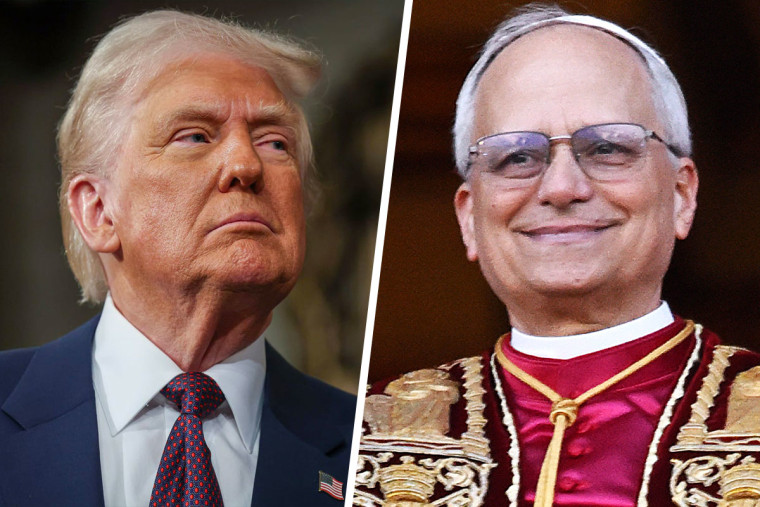VATICAN CITY — The U.S. now has two top-level leaders on the global stage — and there is evidence to suggest Pope Leo XIV will cut a stark contrast to President Donald Trump.
The Chicago-born pontiff, 69, is known as a humble moderate who used his first papal words to urge building “bridges.” Seen as a spiritual successor to the late Pope Francis, Leo was echoing his predecessor’s refrain of building “bridges not walls” — a theme Francis used to openly criticize the Trump administration.
As Cardinal Robert Prevost, Leo also criticized both Trump and Vice President JD Vance on social media. As recently as February, he shared a headline saying that Vance, who is Catholic, was “wrong” to suggest Christians should prioritize loving their countrymen over foreigners.
And like Francis, Leo has expressed deep sympathy for migrants, the poor and those impacted by the climate crisis. He has shared the late pope’s support for appointing women to senior Vatican roles — and his resistance against going all-out in support of female ordination. And he has similarly advocated for an inclusive church that reaches out to other faiths and cultures.

On the other hand, he has not followed Francis’ relative support for LGBTQ+ communities, lamenting in 2012 how TV shows “benignly and sympathetically portrayed” same-sex couples, according to a report by The Arlington Catholic Herald at the time.
The lock-in secrecy of the conclave means we don’t know why the 133 cardinal electors voted for Leo by at least a two-thirds majority. And scholars are divided about how the decision should be interpreted.
For Steven Millies, a professor of public theology at the Catholic Theological Union in Chicago, it’s an unambiguous repudiation of the Trump administration.
“The cardinals took a side: This new pope will stand against this 21st-century variety of authoritarianism we see getting underway in the U.S. and in too many other parts of the globe,” Millies told NBC News. “To choose an American while a second Trump administration is deporting, disappearing [people] and disrupting to such an alarming extent, again, is a message.”
Asked for comment about these criticisms, the White House directed NBC News toward a social media post by Trump in which he said it was a “great honor” to have an American pope and that he looked forward to meeting him, and one from Vance saying he was “sure millions of American Catholics and other Christians will pray for his successful work leading the church.”
Millies likens the cardinals’ choice to the conclave of 1978, when they selected a Polish pontiff in John Paul II, “from behind the Iron Curtain,” he said. “The cardinals were taking a side — they aimed a new pope at the Soviet Union.”
Others are less sure about the conclave’s intentions.
“Either they’ve chosen an American because they think it sends a message that he stands up to Donald Trump and offers an alternative vision of American leadership, or they’ve chosen him despite the fact that he’s American,” said Miles Pattenden, a historian of the Catholic Church at Britain’s University of Oxford.
“It would seem to me to be rather sensational if they picked him just because he was American and could stand up to President Trump,” he added, if nothing else because Trump’s term is brief compared with a potential papal lifetime.
Whatever the cardinals’ reasoning, they have elected a pope whose personality is night and day to Trump’s brusque persona.
Leo is “a quietly confident person, not a flashy personality,” Bishop Robert Barron of the Diocese of Winona-Rochester, Minnesota, told NBC’s “Nightly News” on Thursday. These are qualities that few, including Trump’s most ardent supporters, would attribute to the president.
Even the new pope’s name carries hints he may oppose Trump’s worldview. The last pontiff to take this name was Pope Leo XIII, who in his 25-year papacy from 1878 to 1903 advocated for social justice and workers rights against the nascent forces of capitalism.
“The pope is not going to agree with anything Trump is saying,” said Bill Ciotti, 63, from Boston, who before he retired was responsible for planning liturgy at his church. Ciotti was staying in Rome, a 10-minute walk from the Vatican, with his friend Bill Champlin, a priest at St. Leo Parish in Leominster, Massachusetts. When they saw white smoke billowing on TV while eating dinner, they got up and ran to St. Peter’s Square.
“He’s already criticized Trump and Vance, so I think it’s going to be a major clash,” Ciotti said Friday.
Politically, Leo is “not going to be real far left and he’s not going to be real far right,” his brother John Prevost said in an interview with The Associated Press on Thursday. But he is widely seen as continuing the program that Francis started, which was disliked by many conservative U.S. Catholics.
“I do think one of the dark horses, and unfortunately one of the most progressive, is Cardinal Prevost,” said former Trump adviser Steve Bannon, who is Catholic and strongly opposed Francis’ platform. “I think it’s pretty shocking given the contempt in which they hold the American church.” He added that “my understanding is Prevost is one of the closest to Francis ideologically.”
Ultimately, believers and nonbelievers alike will have to wait and see how the Trump-Leo era plays out.
“Our God is a God of surprises,” said Cesar Jaramillo, 35, a canon lawyer from Paterson, New Jersey, who has lived in Rome for eight years. “The foresight that the Holy Spirit has shown in allowing Leo the opportunity to lead during a very turbulent time, that is a good sign.”

Leave a Reply